Porcelain crowns and veneers in Turkey
Porcelain veneers and crowns are dental restorations used to improve the appearance and function of teeth.
Porcelain veneers are thin, custom-made shells made of dental porcelain that are bonded to the front surface of the teeth. They are primarily used for cosmetic purposes to enhance the appearance of teeth that are discolored, misaligned, chipped, or have gaps between them. Veneers are designed to match the natural color and shape of your teeth and can provide a straighter, whiter, and more uniform smile. The procedure typically involves removing a small amount of enamel from the front surface of the teeth and then placing the veneers using dental adhesive.
What are porcelain veneers and crown?
Porcelain Crowns (Dental crowns, also known as porcelain crowns or dental caps) are tooth-shaped restorations that encase the entire visible portion of a tooth. Unlike veneers, which only cover the front surface, crowns cover the entire tooth structure above the gum line. Crowns are commonly used to restore and protect teeth that are severely damaged, decayed, weakened, or have undergone root canal treatment. They can also be used for cosmetic purposes to improve the appearance of misshapen or severely discolored teeth. Crowns are custom-made to match the color, shape, and size of your natural teeth and are cemented into place over the prepared tooth structure.
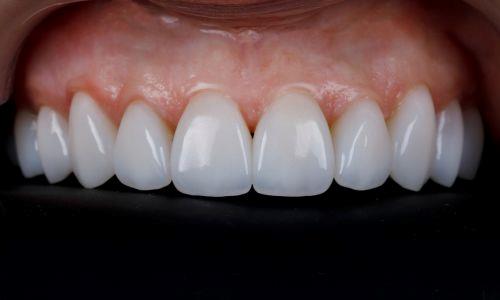
Both porcelain veneers and crowns are durable and resistant to stains, providing long-lasting results. However, the decision to choose between veneers and crowns depends on the specific dental condition and the goals of the patient. It is best to consult with a dentist who can assess your situation and recommend the most appropriate treatment option for your needs.
What are pros and cons of porcelain veneers and crowns?
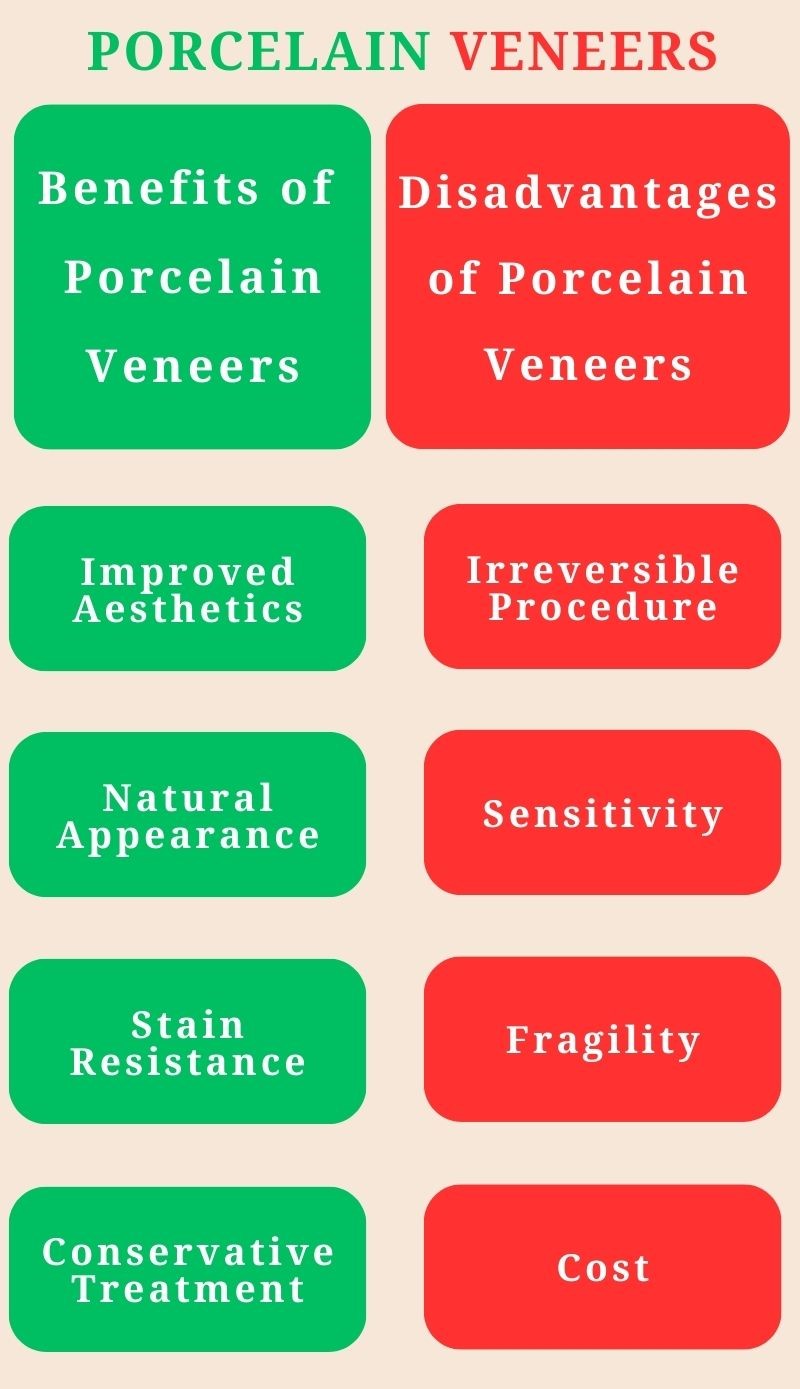
Benefits of Porcelain Veneers:
- Improved Aesthetics: Veneers can dramatically enhance the appearance of your smile by correcting tooth discoloration, gaps, misalignment, and other cosmetic imperfections.
- Natural Appearance: Porcelain veneers closely resemble natural teeth in color, translucency, and texture, providing a natural-looking result.
- Stain Resistance: Porcelain is highly resistant to stains, allowing your veneers to maintain their bright and attractive appearance.
- Conservative Treatment: Veneers require minimal tooth preparation, often involving the removal of a thin layer of enamel, making it a relatively conservative option compared to crowns.
Disadvantages of Porcelain Veneers:
- Irreversible Procedure: The removal of enamel is permanent, and once veneers are placed, you will always require veneers or an alternative restoration on those teeth.
- Sensitivity: Some individuals may experience temporary tooth sensitivity after veneer placement, especially if a significant amount of enamel is removed during the preparation.
- Fragility: While porcelain is durable, it is more prone to chipping or cracking compared to natural teeth or other restorative materials.
- Cost: Porcelain veneers can be expensive, and the cost may vary depending on the number of teeth being treated and the complexity of the case.
Benefits of Porcelain Crowns:
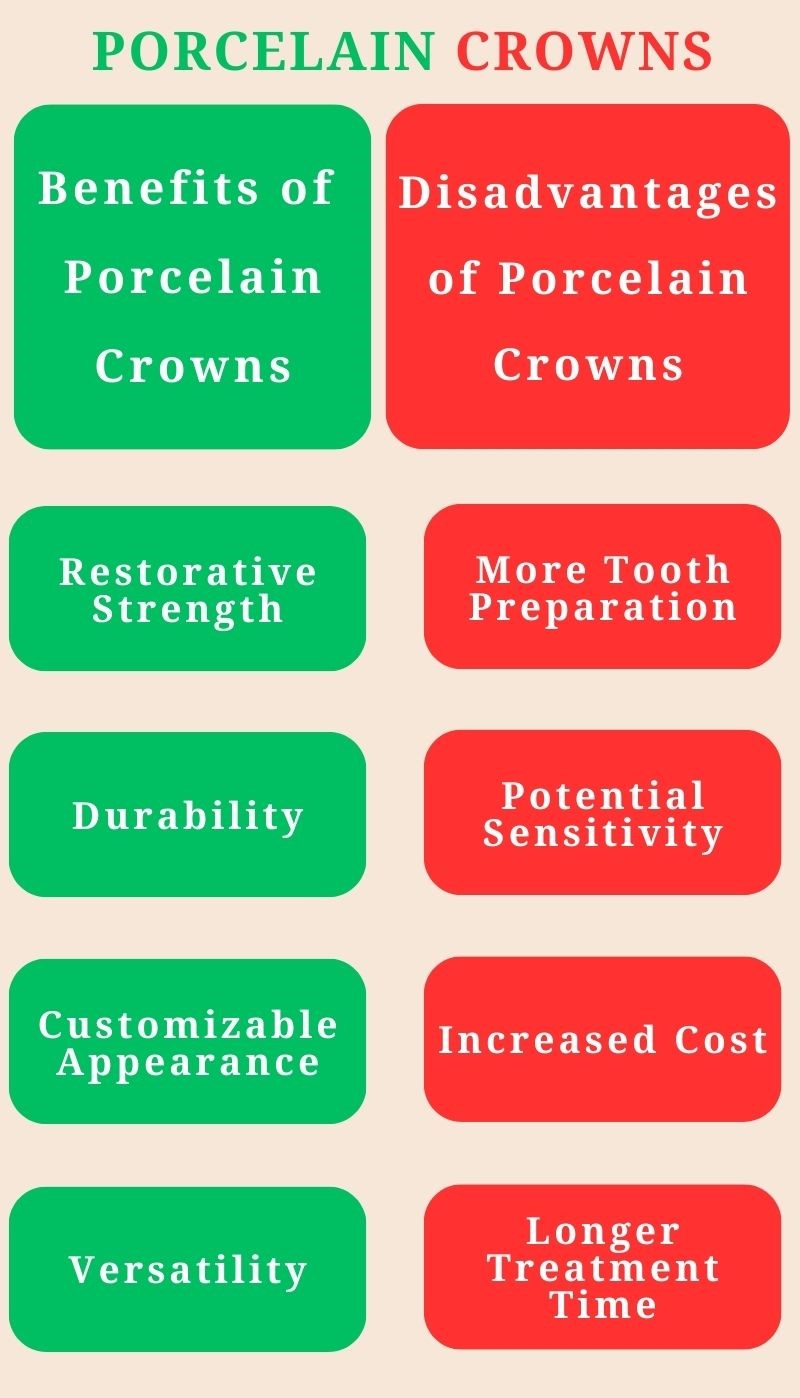
- Restorative Strength: Crowns provide excellent strength and support to teeth that are significantly damaged, decayed, or weakened, restoring their functionality.
- Durability: Porcelain crowns are highly durable and can withstand normal biting and chewing forces, offering long-term stability.
- Customizable Appearance: Crowns can be customized to match the color, shape, and size of your natural teeth, providing a seamless and aesthetically pleasing result.
- Versatility: Crowns can address both cosmetic concerns and structural issues, making them a versatile treatment option.
Disadvantages of Porcelain Crowns:
- More Tooth Preparation: Compared to veneers, crowns require more extensive tooth preparation, which involves removing a significant portion of the tooth structure.
- Potential Sensitivity: Similar to veneers, some individuals may experience temporary tooth sensitivity after crown placement.
- Increased Cost: Porcelain crowns are generally more expensive than veneers due to the additional material and laboratory work involved.
- Longer Treatment Time: The process of getting a crown typically requires multiple dental visits and may take longer to complete compared to veneers.
It's important to note that the specific benefits and disadvantages can vary depending on individual cases, and it's recommended to consult with a qualified dentist to determine the best treatment option for your unique needs.
Who can have porcelain veneers and crowns?
Determining your candidacy for porcelain veneers or crowns requires a thorough evaluation by a qualified dentist. However, here are some general factors that dentists consider when assessing candidacy for these treatments:
Porcelain Veneers:
- Tooth Condition: Veneers are typically recommended for teeth with cosmetic issues such as discoloration, minor misalignment, chips, or gaps. If your teeth have significant structural damage or decay, other restorative options like crowns may be more suitable.
- Sufficient Tooth Enamel: Veneers require the removal of a thin layer of enamel to accommodate the thickness of the veneer. Sufficient enamel is necessary for a successful veneer placement.
- Oral Health: You should have good oral health, including healthy gums and no active gum disease or untreated tooth decay, before considering veneers.
- Bite Alignment: Veneers may not be recommended if you have severe bite misalignment or a significant overbite/underbite. In such cases, orthodontic treatment or other dental procedures may be necessary.
Porcelain Crowns:
- Tooth Damage: Crowns are often used to restore teeth with significant structural damage, decay, or fractures that cannot be adequately repaired with more conservative treatments.
- Root Canal Treatment: Teeth that have undergone root canal treatment are often crowned to protect the weakened tooth structure and restore functionality.
- Large Fillings: Teeth with large fillings that compromise their strength and stability may require crowns to reinforce and protect them.
- Esthetic Concerns: Crowns can also be used for cosmetic purposes to improve the appearance of severely discolored, misshapen, or poorly positioned teeth.
It is best to consult with a dentist who can evaluate your specific oral condition, discuss your treatment goals, and provide personalized recommendations based on your unique situation. They will be able to determine if porcelain veneers, crowns, or any other dental treatments are suitable for you.
What are steps of porcelain veneers and crowns treatment?
Porcelain veneers
To assess your oral health and establish whether you're a good candidate for veneers, your dentist will inspect your teeth, take impressions, and sometimes X-rays or photographs.
The front surfaces of the teeth that will receive veneers have a tiny bit of enamel removed.
After your teeth have been cleaned and prepped, your dentist will make an impression of them.
Veneers: Temporary veneers may be bonded to your teeth.
When your permanent veneers are prepared, you will have for the last stage, veneer bonding.
Porcelain crowns
Just as with veneers, the health of your tooth may be assessed using X-rays or other diagnostic equipment.
In order to prepare the impacted tooth, any decaying or damaged regions must be removed.
An impression of your tooth and the surrounding area is taken after dental preparation.
A temporary crown is installed.
You'll need to go back to the dentist's office for the last step once your permanent crown is prepared.
Please click here to get more info!
FREQUENTLY ASKED QUESTIONS
How much do porcelan veneers and crown cost in Turkey?
The cost of porcelain teeth treatment in Turkey may vary depending on a number of factors, such as the complexity of the case, the number of teeth involved, the specific dental facility, and the location within Turkey, which is usually considered an affordable destination for dental procedures when compared to several Western countries.
The porcelain dental veneers cost approximately $150-300 per tooth in Turkey. If you need multiple veneers, you can save more by buying a package.
Please click here to get more info!
Will I feel pain during porcelain veneers and crowns treatment?
The placement of porcelain veneers and crowns is typically not painful. The procedures are performed using local anesthesia to numb the teeth and surrounding tissues, ensuring that you experience minimal discomfort during the treatment. You may feel slight pressure or vibrations during the tooth preparation process, but it should not be painful.
After the procedure, it is common to experience some temporary sensitivity or discomfort, especially around the treated teeth. This sensitivity is usually mild and can be managed with over-the-counter pain relievers or desensitizing toothpaste. It should subside within a few days to a week as your teeth adjust to the new restorations. It's important to note that every individual's pain tolerance and response to dental procedures may vary. Some people may experience minimal discomfort or sensitivity, while others may be more sensitive or have additional factors that contribute to discomfort. If you have any concerns about pain or discomfort during or after the placement of porcelain veneers or crowns, it is best to discuss them with your dentist. They can provide information specific to your case, address any questions or anxieties you may have, and ensure your comfort throughout the process.
Are porcelain veneer and crown treatment safe in Turkey?
Porcelain veneers and crowns treatments in Turkey can be secure if they are carried out in trustworthy, licenced dental offices. Turkey is becoming known as a well-liked location for dentistry and medical tourism, and a large number of Turkish facilities uphold strict safety and quality regulations. Porcelain veneer and crown procedures in Turkey are safe with skilled dentists, accredited clinics, modern Facilities and technology, stringent sterilization and infection control, patient reviews and recommendations.
Please click here to get more info!
What should you do before and after porcelain veneer and crown treatment?
Before Porcelain Veneer and Crown Treatment:
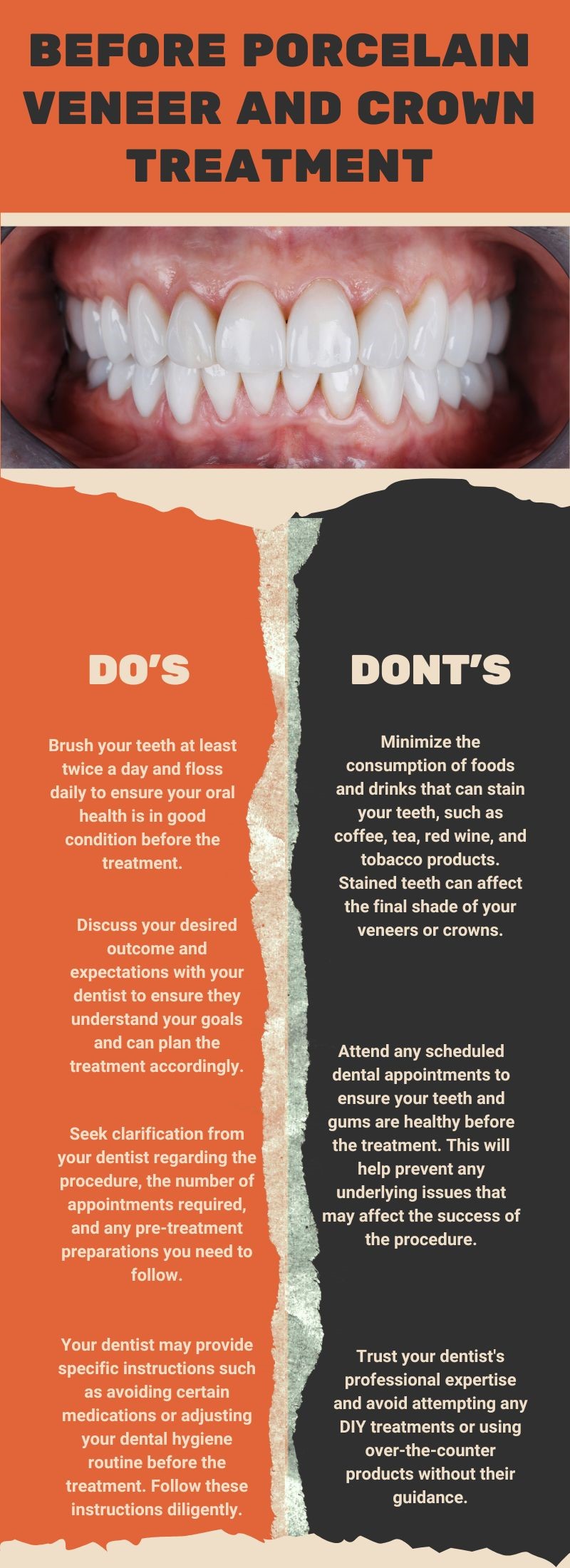
Do these
- Brush your teeth at least twice a day and floss daily to ensure your oral health is in good condition before the treatment.
- Discuss your desired outcome and expectations with your dentist to ensure they understand your goals and can plan the treatment accordingly.
- Seek clarification from your dentist regarding the procedure, the number of appointments required, and any pre-treatment preparations you need to follow.
- Your dentist may provide specific instructions such as avoiding certain medications or adjusting your dental hygiene routine before the treatment. Follow these instructions diligently.
Don't do
- Minimize the consumption of foods and drinks that can stain your teeth, such as coffee, tea, red wine, and tobacco products. Stained teeth can affect the final shade of your veneers or crowns.
- Attend any scheduled dental appointments to ensure your teeth and gums are healthy before the treatment. This will help prevent any underlying issues that may affect the success of the procedure.
- Trust your dentist's professional expertise and avoid attempting any DIY treatments or using over-the-counter products without their guidance.
After Porcelain Veneer and Crown Treatment:
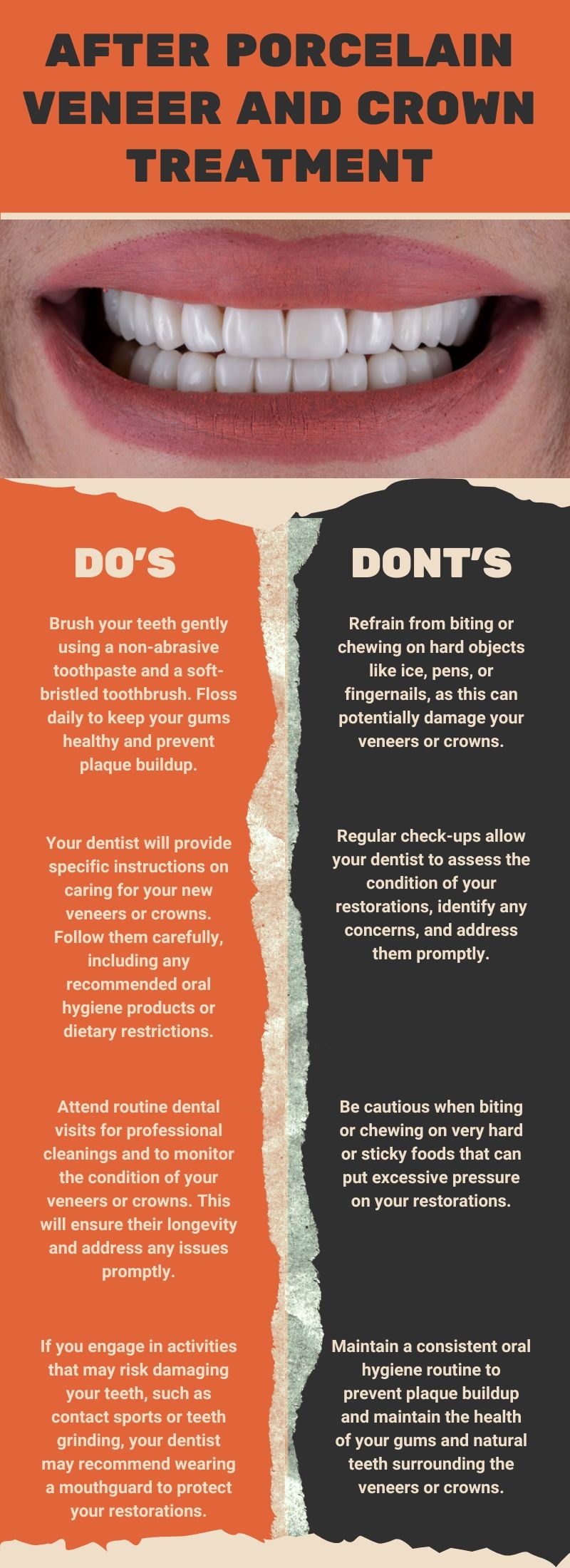
Do these
- Brush your teeth gently using a non-abrasive toothpaste and a soft-bristled toothbrush. Floss daily to keep your gums healthy and prevent plaque buildup.
- Your dentist will provide specific instructions on caring for your new veneers or crowns. Follow them carefully, including any recommended oral hygiene products or dietary restrictions.
- Attend routine dental visits for professional cleanings and to monitor the condition of your veneers or crowns. This will ensure their longevity and address any issues promptly.
- If you engage in activities that may risk damaging your teeth, such as contact sports or teeth grinding, your dentist may recommend wearing a mouthguard to protect your restorations.
Don't do
- Refrain from biting or chewing on hard objects like ice, pens, or fingernails, as this can potentially damage your veneers or crowns.
- Regular check-ups allow your dentist to assess the condition of your restorations, identify any concerns, and address them promptly.
- Be cautious when biting or chewing on very hard or sticky foods that can put excessive pressure on your restorations.
- Maintain a consistent oral hygiene routine to prevent plaque buildup and maintain the health of your gums and natural teeth surrounding the veneers or crowns.
What are differences between porcelain veneers and crowns?
The primary difference between these two operations is that a crown completely encases a tooth, whilst a veneer only covers the tooth's surface. Each application achieved a notable level of success in spite of its variations. The main purpose of veneers is cosmetic since they are made of extremely thin porcelain. Veneers are attached to the front of teeth with the use of medical adhesives. To aid the veneer's adherence to the tooth beneath, the tooth's surface is somewhat worn down and given a rough texture.
The front teeth are the most often treated areas with porcelain veneers. In addition to fixing broken teeth, veneer the anterior teeth for aesthetic purposes also makes a person look younger and more confident. Porcelain crowns are the ideal treatment for teeth.
Please click here to get more info!
What are some risks of porcelain veneers and crowns treatments?
Porcelain crowns and veneers are usually risk-free and have few adverse effects. But there are a few things to be mindful of and possible side effects to be aware of: temporary tooth sensitivity after getting porcelain veneers, temporary gum irritation or inflammation around the treated teeth, allergies or sensitivities to the materials used in porcelain restorations, porcelain materials may not be as responsive to teeth whitening procedures.
Please click here to get more info!
Is the success rate of porcelain veneers and crowns procedure high?
The success rate of porcelain veneers and crowns is high when placed by skilled and proficient dentists. Although an exact success percentage is impossible to offer, research and clinical observations suggest that porcelain veneers and crowns often have a high success rate. A comprehensive evaluation that was published in the Journal of Dentistry found that over a 5- to 10-year follow-up period, the survival percentage of porcelain veneers varied from 94.5% to 100%.
Please click here to get more info!
